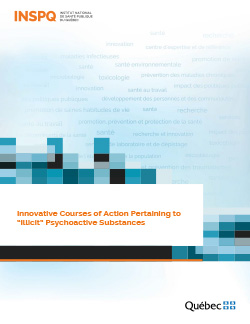Innovative Courses of Action Pertaining to “Illicit” Psychoactive Substances
This report is the result of a mandate from the Ministère de la Santé et des Services sociaux (MSSS) [Québec’s ministry of health and social services] to produce a knowledge synthesis focused on nine courses of action which pertain to “illicit” psychoactive substances and which have not been implemented, or have been implemented only on a limited scale or as a pilot project in Québec.
The nine courses of action are:
- Education programs for overdose prevention and management with naloxone;
- Supervised consumption services;
- Prison syringe exchange programs;
- Low-threshold housing programs;
- Crack smoking equipment distribution programs;
- Programs for prevention and substance analysis in festive environments;
- Commissions for the dissuasion of drug addiction;
- Cannabis ticketing schemes;
- Drug treatment courts.
These interventions have the potential to amplify the beneficial effects and to reduce the negative effects of our current system for controlling what are referred to as illicit psychoactive substances.
For each course of action, the analysis covers six dimensions:
- A description of the intervention;
- The logic of action and objectives;
- Precedents and institutional endorsement outside Québec;
- The evaluations of their effectiveness;
- Legal aspects; and
- Some implications regarding the intervention in the Québec context.
The analysis presented is not intended to provide conclusive responses to the issues tied to the use of illicit psychoactive substances, but rather to inform the much needed discussion about this subject.
Within the context of the federal legal system, Québec authorities possess a margin of manoeuvre sufficient to permit the introduction of most of these interventions. Moreover, most of these interventions have already been implemented in Québec or elsewhere in Canada.
Cannabis ticketing schemes are the exception, because they would likely require the establishment of a new regulation by the federal government.
In the case of commissions for the dissuasion of drug addiction, it seems that a closely related intervention could be implemented, within the framework of the current Program to deal non-judicially with certain criminal offences committed by adults. In this case, they would have to be introduced without the legislative change that accompanied their introduction in Portugal (the repeal of criminal penalties for possession of all currently illicit drugs), as this falls within the federal government’s authority.
The potential of these interventions was evaluated assuming their addition to the current system. If the resources used to implement the interventions being considered are instead drawn from resources currently devoted to other interventions, the expected benefits must be re-assessed.
Furthermore, within Québec there exists a knowledge gap concerning certain aspects of drug use. This lack of knowledge deprives us of the means of evaluating several potential forms of intervention that might be more efficient, effective or cost-effective. This synthesis proposes a few avenues for addressing this problem.


